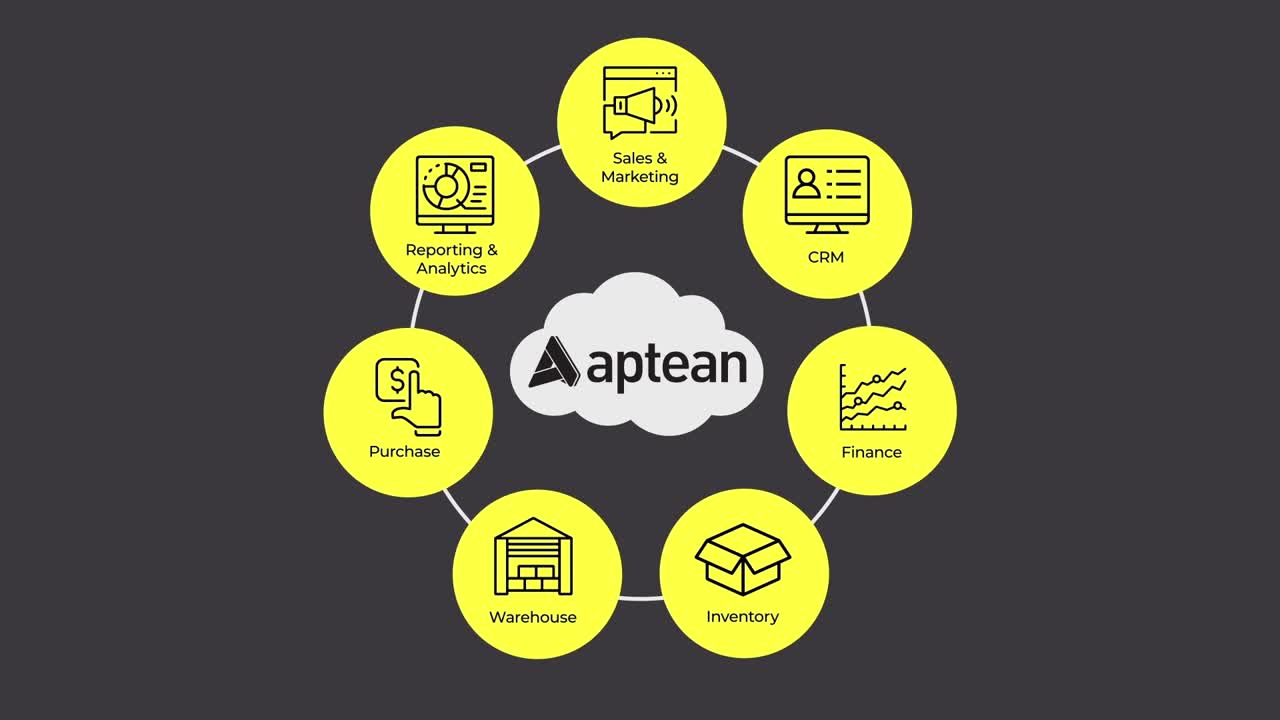Destacado en este post
Process Manufacturing ERP Software: The Ultimate Guide
Process Manufacturing ERP Software: The Ultimate Guide
27 Oct 2021
 Daniel Erickson | Senior Product Manager
Daniel Erickson | Senior Product Manager
If you’re a batch manufacturing business and you’re considering an upgrade to new operational technology, you’re in the right place.
Aptean’s ultimate guide to process manufacturing ERP software contains all the information you’ll need to create a strong business case, choose a best-fit ERP solution for your business and work with a technology vendor who understands how to implement process manufacturing software to deliver rapid value and drive long-term success.
Let’s dive in…
What Is Process Manufacturing ERP Software?
For those of you who aren’t familiar with the term, ERP stands for enterprise resource planning. It’s a type of digital software that combines useful features for the day-to-day running of your company—including back-office admin, automating operational processes, visualizing and analyzing business data and financial management.

While most ERP systems will have a common set of features, process manufacturing ERP software has the additional benefit of including functions that are specific to the process manufacturing industry. For example, digital tools to support or enhance batch manufacturing, quality control and regulatory compliance. By utilizing industry-specific functionality, you’re able to maximize the benefits and ROI from your ERP solution and ensure it continues to grow with you as your company and wider industry evolve.
Keep reading to find out more about what these features entail and how they can benefit your process manufacturing organization.
Process Manufacturing Software: Who Is It For?
Process manufacturing technology is best suited to businesses that are creating products using a combination of raw materials or ingredients that can’t be returned to their original state once combined. The needs of a manufacturer using recipes or formulas to create customer orders are different to those dealing with a bill of materials, where components can be added, removed or changed easily.
ERP software for process manufacturers is most popular in industries with high volume batch manufacturing requirements, such as:
Pharmaceuticals
This is because industry-specific software supports the accurate measurement of ingredients; safe and hygienic production; carefully managed distribution; and batch traceability—things we’ll talk about in greater detail momentarily.
What Industry Challenges Can Process Manufacturing Software Solve?
In the tightly regulated, highly precise process manufacturing industry, there’s a lot that can go wrong. Which is why so many organizations turn to ERP software to manage everyday challenges and issues.
Some of the most common industry problems that process manufacturing ERP software can help you solve include:
Batch consistency: ERP will standardize recipe/formula management, control production processes and manage distribution logistics, to ensure a consistently high standard of output. This is especially important for batch manufacturing involving complex recipes, or for formulas where ingredients can vary in grade and quality, such as cannabis manufacturing.
Product recalls: Your organization can use ERP data to recall products quickly and comprehensively if there’s been a quality control issue with any ingredients—and trace the origin of the problem, to mitigate the risk of it happening again. To learn more, read our blog post: Manage and Mitigate the Risk of Product Recalls With Process Manufacturing ERP.
Ingredient shortages: Without accurate scheduling and forecasting, it’s easy for inventory availability, workload and supply chain logistics to get out of sync. Process manufacturing ERP gives you the real-time data insights to accurately coordinate/order ingredients based on actual customer demand, as well as managing supplier requirements more effectively.
Regulatory changes: Industry protocol and red tape is always evolving, and it can be difficult for process manufacturers to reflect this in your operations. Specialized ERP software can quickly roll-out new instructions and documentation to personnel, along with putting additional compliance checks in place to make sure you’re following sector legislation to the letter.
What Features Should Your Process Manufacturing ERP Software Include?
It pays to carefully research what each process manufacturing ERP solution you’re considering includes as standard and compare them like-for-like to see which software offers you the most comprehensive functionality. However, some of the key features to look out for include:
Recipe/Formulation Management
Batch manufacturing operations need to not only calculate recipes accurately, but also scale measurements and update/revise ingredients and quantities in line with customer requirements, including recipes or formulas that involve mixed units of measure. This can be especially valuable for sectors in which changing trends impact product composition, such as cosmetics manufacturing.
Inventory Management
Every type of manufacturing involves raw materials, but process manufacturing can be particularly challenging to manage because you’re often dealing with ingredients in a non-solid state (e.g. liquids, gases and powders), and many of these materials will be perishable. Tailored process manufacturing ERP software can help you track where and how these ingredients need to be stored and how long you’ve got to use them. And the system can also help you synchronize inventory with your production schedule to prevent shortages and reduce overages. Inventory management functionality can also support stronger distribution and supply chain logistics, so you can understand the impact of delayed or canceled orders on your production and fulfilment schedule—including the availability of product packaging and labels, as well as raw ingredients.
Regulatory Compliance
Depending on the sub-industry you operate in, there may be strict regulatory measures you need to meet, such as detailing nutritional information and allergens on food and beverage items. Equally, there are detailed regulations around how chemical products need to be labeled, in line with the United Nations’ Globally Harmonized System of Classification (GHS). Process ERP software helps you to capture and document this information to achieve industry compliance. The best ERP software can also add value for batch manufacturers in sectors where regulations vary from region to region—for example, legal cannabis and CBD product manufacturing. You can find out more about this industry in our blog post: How Can Process Manufacturers Use ERP Technology to Tap Into the $49 Million Legal Cannabis Market?
Lot Traceability
Tracking raw ingredients from end-to-end is critical for quality control purposes (including product recalls, as we mentioned earlier), as well as the standard and consistency of batch production. However, it’s especially important if you’re working with ingredients that have a limited shelf-life, as ERP software for process manufacturers will help you manage expiration dates to limit wasted resources. Ingredient traceability can also be useful in tracking the disposal of regulated ingredients, such as industrial waste in the chemicals sector.
How Can You Find The Right System For Your Process Manufacturing Business?
Choosing an industry-specific process manufacturing ERP system is a critical first step to making a solid investment, as you need software that includes all the features we outlined above. However, it’s not just what the software does that will impact your return on investment; your choice of ERP technology provider will also influence success.
Make sure you carefully vet process manufacturing ERP vendors before proceeding, to ensure they have experience with successfully implementing projects in your sector. Don’t be afraid to ask for case studies and customer testimonials as evidence of their track record.
A good partner will listen to your reasons for onboarding process manufacturing ERP software and take time to understand the current set-up and needs of your organization. They’ll use this information to support a strong plan of action, incorporating training and customer support as part of the roll-out process, to make sure your chosen ERP system delivers value early-on.
Our blog post on 11 ERP Implementation Best Practices can help you to drive success from day one.
Why Choose Aptean Process Manufacturing ERP?
Our ultimate guide has shown you the benefits to investing in industry-specific ERP software, and Aptean Process Manufacturing ERP is a valuable investment.
We have a proven track record in providing process manufacturing software to organizations across sub-sectors including chemicals, cosmetics, food and beverage and pharmaceuticals. For example, chemical company Hammond Group reduced IT costs by 39% in the first year of implementing Aptean Process Manufacturing ERP.
We’re not just a software vendor; Aptean forms solid partnerships with process manufacturers, to make sure our ERP software is delivering value day after day.
To find out more, request a demo with one of our industry experts.
¿Todo listo para transformar tu negocio?
Tenemos el software especializado en tu sector que ayudará a tu organización a prosperar.



